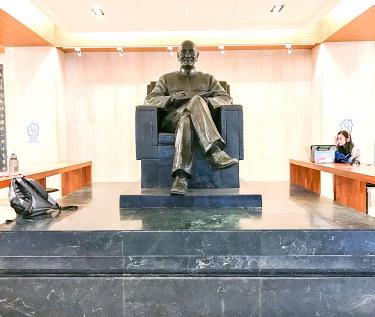National Chengchi University yesterday passed a motion at an administrative affairs meeting that called for statues of Chiang Kai-shek (蔣介石) to be removed as part of efforts to promote human rights and transitional justice.
The decision was in response to protests last year, when students plastered a statue of Chiang with fliers containing the names of people killed in the 228 Incident and called for the statue’s removal.
The university was established in Nanjing, China, in 1927 to train people to serve in the Chinese Nationalist Party (KMT) and was moved to Taiwan when the party fled China.
Chiang was president of the institution from its establishment until 1947 and was given the honorary title of “perpetual president emeritus.”
Two large bronze statues of Chiang were erected at the university: one in a sitting position in the library and one on horseback at the rear of the school’s campus.
Hsu Tzu-wei (徐子為), head of the university’s graduate students association, said that after last year’s protests by the Wildfire Front student group, university officials repeatedly delayed the removal of the statues.
Opponents said at the meeting that removing the statues would hurt the school’s integrity and international reputation, adding that Chiang’s contributions should be discussed alongside his mistakes.
Removing the statues would be an important first step toward transitional justice, Hsu said, adding that the 228 Incident and the subsequent White Terror era were the direct result of Chiang’s authoritarian rule.
As some of the university’s students are descendants of White Terror victims, honoring Chiang with statues is a second attack on victims’ families, he added.
The four-hour meeting ended with 52 of 68 votes in favor of the statues’ removal, Graduate Institute of Development Studies professor Lee Yeau-tarn (李酉潭) said.
Lee said he would lead a team of seven other professors and three student representatives to discuss how to move forward with relocating the statues to an “appropriate location.”
National Taiwan University history professor Hua Yih-fen (花亦芬) lauded the decision, saying that educators should seek to espouse the values of freedom and democracy, adding that allowing the statues to remain at the university would run counter to those values.
“Fortunately, National Chengchi University was willing to follow sound advice,” she said, adding that transitional justice involves more than just judicial and political elements.
“The removal of the statues honoring Chiang was long overdue,” National Chengchi University associate professor Liu Hung-en (劉宏恩) said.
Regardless of one’s evaluation of Chiang as a political leader, it is absurd to have a president’s statue on campus that is more than three times taller than a person’s height, he said.
If the statues were meant to honor the university’s founder, then every institution should have similar statues, Liu said, adding that the university’s association with a particular party is a source of frustration for many students and professors.
“If it is not a KMT school, why are statues from the period of authoritarian KMT rule kept?” Liu asked.
“What is the reason behind keeping the statue of someone who killed so many people?” asked one student, who declined to be named.
Source: Taipei Times - 2017/01/14





















